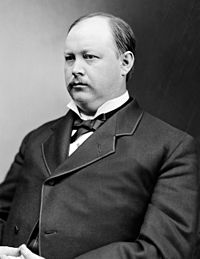Thomas Brackett Reed
| Thomas Brackett Reed | |
|---|---|
 |
|
| 32nd Speaker of the United States House of Representatives | |
|
In office December 2, 1895 – March 3, 1899 |
|
| President |
Grover Cleveland William McKinley |
| Preceded by | Charles F. Crisp |
| Succeeded by | David B. Henderson |
|
In office December 4, 1889 – March 3, 1891 |
|
| President | Benjamin Harrison |
| Preceded by | John G. Carlisle |
| Succeeded by | Charles F. Crisp |
| Member of U.S. House of Representatives from Maine's 1st district |
|
|
In office March 4, 1877 – September 4, 1899 |
|
| Preceded by | John H. Burleigh |
| Succeeded by | Amos L. Allen |
| Maine Attorney General | |
|
In office 1870–1872 |
|
| Preceded by | William P. Frye |
| Succeeded by | Harris M. Plaisted |
| Member of the Maine Senate | |
|
In office 1870 |
|
| Member of the Maine House of Representatives | |
|
In office 1868–1869 |
|
| Personal details | |
| Born |
October 18, 1839 Portland, Maine |
| Died |
December 7, 1902 (aged 63) Washington, D.C. |
| Political party | Republican |
| Alma mater | Bowdoin College |
| Profession | Law |
Thomas Brackett Reed (October 18, 1839 – December 7, 1902), occasionally ridiculed as Czar Reed, was a U.S. Representative from Maine, and Speaker of the U.S. House of Representatives from 1889–1891 and also from 1895–1899. He was a powerful leader of the Republican Party, and during his tenure as Speaker of the House, he served with greater influence than any Speaker who came before, and he forever increased its power and influence for those who succeeded him in the position.
Reed was born in Portland, Maine, the son of Matilda Prince (Mitchell) and Thomas B. Reed. Reed attended public school, including Portland High School, before graduating from Bowdoin College in 1860. He studied law. After college, he went on to become an acting assistant paymaster for the United States Navy from April 1864 to November 1865 and was admitted to the bar in 1865. He practiced in Portland and was elected to the Maine House of Representatives in 1868 and 1869. He served in the Maine Senate in 1870 but left to serve as the state's Attorney General from 1870 to 1872. Reed became city solicitor of Portland from 1874 to 1877 before being elected as a Republican to the Forty-fifth and the eleven succeeding Congresses, serving from 1877, to September 4, 1899, when he resigned.
He was known for his acerbic wit (asked if his party might nominate him for President, he noted, "They could do worse, and they probably will"). His size, standing at over 6 feet in height and weighing over 300 lbs (136 kg), was also a distinguishing factor for him. Reed was a member of the social circle that included intellectuals and politicians Henry Cabot Lodge, Theodore Roosevelt, Henry Adams, John Hay and Mark Twain.
...
Wikipedia
